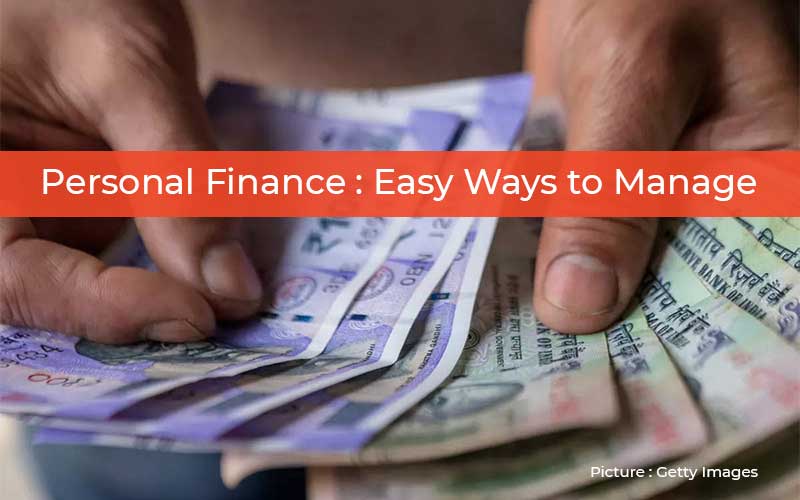
Easy Tips to Manage Personal Finance
Isn't it great to never have to worry about money or manage your finances again if there were a magic formula or simple trick?
While that might not be practical, there are several other approaches we can take to manage our own finances. When it comes to managing our finances, there is one issue that we all struggle with. The key to managing your finances is keeping track of your spending, setting aside money for the future, and achieving your goals.
In this blog, we will discuss some of the ways to manage your personal finances and how to protect your hard-earned cash.
#Tip 1
Creating a Budget
One of the best ways to handle personal finances is to create a budget. A budget is meant to assist you in reaching your objective without spending money on items that are not necessary. Budgets might be extensive or in-depth. It's important to set up a budget so that you can pay your regular bills on time and save some money for the future.
You can start out by using the 50/30/20 rule. The rule is relatively easy to implement. 50% of your income will go toward meeting your basic necessities (such as food and bills), 30% will go toward satisfying your wants (such as luxuries or desires), and the other 20% will go toward your savings (this is the amount that you should consider putting up for investments).
#Tip 2
Use Cash, Not Plastic Money
Although card (or online) payment options are pretty convenient for your day-to-day purchases, using cash instead is actually helpful if you’re looking for ways to limit overspending. When you pay with cash, you have a better track of your transaction trails as you can literally see how much money you have, how much is being spent and how much are you left with. In case of cashless transactions, you get the false sense that you aren’t really parting with your money, and that’s how you tend to spend more than required.
Here’s how you can test it out - If you usually get your grocery purchases on your card, try paying with cash instead the next time, and give yourself an approximate budget based on your requirements. You’re very likely to readjust your shopping patterns to fit your budget and hence avoid overspending.
Alternatively, the next time you’re out with your friends at a restaurant, make it a point to settle the bill in cash and you’ll notice that you are more likely to order under budget.
#Tip 3
Investments
The key to making money from money is to invest. Even though most of us have investments, they are not reliable. Our inconsistent investing patterns can render our efforts useless.
Nowadays, it's simpler to invest your money without going anywhere or standing in a long queue. Depending on your goal, invest in stocks, mutual funds, real estate, and other opportunities.
For instance, you can set up a monthly SIP of mutual funds (there are many to choose from), where you can invest monthly, or you can experiment with various brokers to invest in stocks.
As a result of the compound interest that stocks and mutual funds provide, your savings will grow over the years significantly.
Online platforms are Groww, Zerodha has made investing even simpler nowadays. However, it is advisable that you consult with a market expert before investing your money, in order to avoid potential losses and create future wealth out of your invested amount.
#Tip 4
Clear Your Debts
Paying your debts as soon as possible will help you to come out of the debt cycle and will save you from the stress of high debts. Debts are very easy to accumulate but very challenging to get rid off. Make sure you don't borrow money from any banks or organisations if you don't need to.
However, if you find yourself in a situation where you’ve incurred a lot of debt and have difficulty figuring out how to pay it off, there are a couple of strategic approaches you can adopt to help you clear your dues at the earliest. Some debt-paying techniques include the Debt Snowball Method (Paying the Smaller Debt First) and the Debt Avalanche Method (Paying the Larger Debt First) can help you out in paying off debts.
#Tip 5
Track Your Spending
The above strategies for financial management are helpful, but recording your finances every day will enable you to keep track of how much you spend on necessities, luxuries, and savings.
Regularly tracking your expenditures will help you get a clear picture of where your money is going and where you'd prefer it to go.
These were some of the ways
one could apply to manage their personal finances. It doesn't have to be
challenging to pay off your debt, save money, and accomplish your financial
targets. Give yourself a chance to succeed; your financial future depends on
it.
Disclaimer: The opinions expressed in this article are those of the author's. They do not purport to reflect the opinions or views of The Critical Script or its editor.

Newsletter!!!
Subscribe to our weekly Newsletter and stay tuned.

















Related Comments